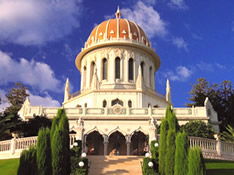 |
Shrine
of the Bab Haifa |
At midday on 9 July each year Baha’is the world over read special prayers in remembrance of the death of one of the founders of the religion. Mirza Ali Muhammad, who assumed the title of the Bab (‘Gate’), was an inspirational social and religious reformer in 19th century Persia. Predicting the coming of a new age of human development, he gained considerable following. However his message alarmed the conservative religious establishment, and he was accused of being a heretic and a dangerous rebel: he was arrested, and his execution ordered.
On 9 July 1850 the sentence was carried out in the courtyard of the Tabriz army barracks. Thousands of onlookers crowded the rooftops of the barracks and houses overlooking the square. The Bab and a young follower were suspended by ropes against a wall, and a regiment of 750 Armenian soldiers opened fire, creating such a cloud of smoke and dust that the entire yard was obscured.
Sir Justin Shiel, Queen Victoria’s envoy in Tehran, wrote: “When the smoke and dust cleared away after the volley, Bab was not to be seen, and the populace proclaimed that he had ascended to the skies.” Apparently during the shooting the ropes restraining him and his companion had broken and they had escaped; when they were subsequently found and returned to the square, the Armenian soldiers refused to fire again, and had to be replaced by a contingent of Muslim soldiers.
Following
the execution the bodies were thrown into a moat outside the twon, where
they were rescued by the Bab’s followers, eventually to be buried
on Mount Carmel in Israel, in a shrine that is now a place of pilgrimage
for Baha’is.